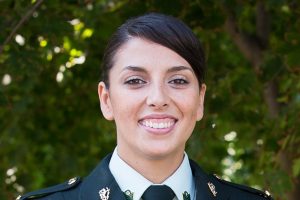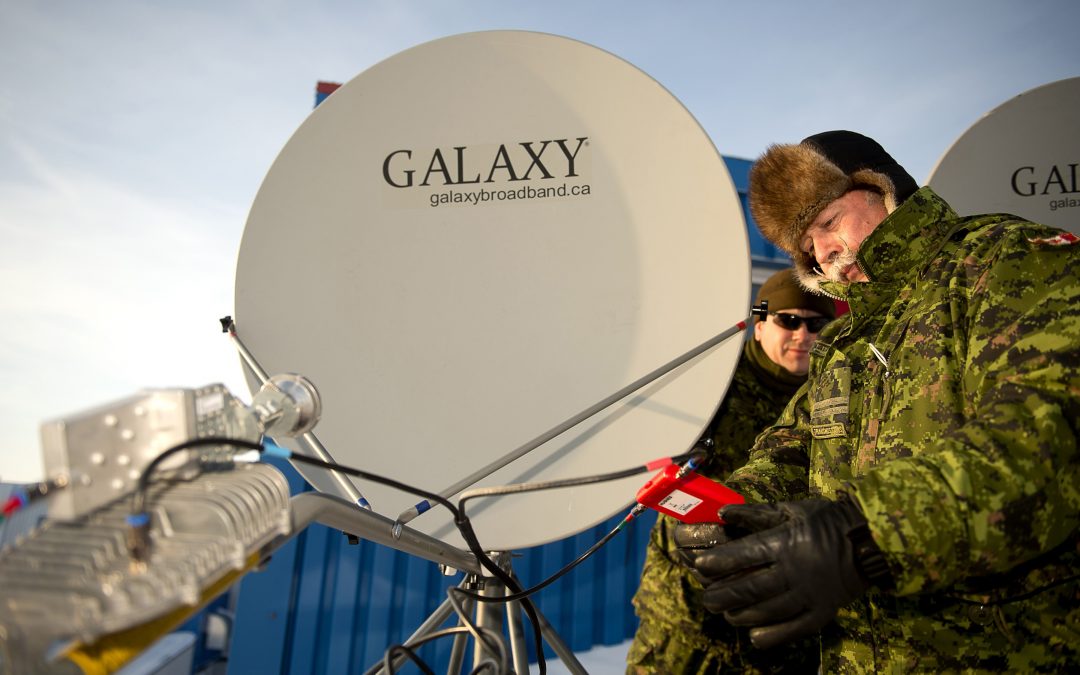Few trades in the Canadian Armed Forces are changing as rapidly as signals officers or are in such high demand. Warrant Officer Sara Anvari, a Reservist attached to 33 Signals Regiment in Ottawa, spoke with Canadian Army Today about the challenges of the trade and how her skills translate to her civilian job.
What’s your role with 33 Signals Regiment?
I am currently the signal troop warrant officer for 763 Squadron, which is the operational squadron of 33 Signals Regiment. I’m posted here for the year. My home unit is 34 Sigs in Montreal. On the technical side, my role is providing subject matter expertise to commanders on what we can provide from a communications point of view to enable command and control. That could range from IT systems to line systems to different radio capabilities, both secure and clear. On the leadership side, I’m responsible for the welfare, professional development and discipline of the troops within my troop.

Sara Anvari
What makes this a priority occupation?
Information is power. Information is where battles are lost and won. As much as that’s true for business today, and why there are so many investments in information technology (IT) and information security, I think it is absolutely true for the military. Our trade is one that is mission critical. It’s the backbone of how commanders do their job and there are only going to be more opportunities in this field as we expand how the military addresses questions of cyber security, signals intelligence and electronic warfare with more robust technologies and capabilities.
Did you choose the trade or did it choose you?
It was mutual. When I joined, I was quite young and didn’t have a very good picture of the Army, how I could contribute, and what I wanted to get out of it. It was a happy accident that I ended up at 34 Sigs, which was then called 712 Communications Squadron. Why do I think it was mutual? After meeting the folks of my unit that first year – before my basic training and my apprentice course – I was hooked on the people; after my apprenticeship, I certainly saw the value of what we were doing.
Is this a versatile trade?
It is super diverse. As signallers we have the opportunity to work at a tactical level in austere conditions in the field, and we also have opportunities to work in more strategic roles in garrison. There is definitely no lack of career options within the trade.
What’s the most challenging aspect of what you do?
There have been so many technology evolutions and changes in the capabilities that we provide commanders. When I joined there were three branches: traditional radio operators, linemen and technicians. And in the past few years that has all been folded under one umbrella with a fourth subtrade that deals with IT. And the biggest challenge is keeping abreast of the rapidly evolving technology landscape and bringing that to bear to meet the needs of commanders on the ground.
Do you feel you’re working with at the cutting edged of technology?
The Canadian Armed Forces has been a real leader in terms of developing and implementing capabilities that are modern and flexible: Modern in that they are keeping up with the times and doing so in a secure way; and flexible in that there are a range of solutions, whether data or voice, that we can implement and use, whether by an individual soldier in a section who needs to communicate up to his platoon, or as a rear link for a deployed battalion that needs to communicate back to Canada.
Is there a “best day” doing this?
One that comes to mind is an exercise a number of years ago in northern Quebec in February. We were able to collaborate with the Canadian Rangers and get a look at how they were meeting the challenges of communicating in such austere conditions. And then we were able to put that into practice immediately and play a critical role, not just in command and control, but also as a safety net for our people who were very dispersed over a large geographical area and needed to communicate at all times.
As a Reservists, how do your military skills translate to your civilian work?
Currently I am a senior manager leading a cyber intelligence team. My experience in the military as a signaller is directly linked to what I’m doing because my role has a lot to do with understanding a threat landscape that is asymmetric and that is based in technology. From a technical point of view, I am able to leverage my skills from the Army. And from a leadership and management point of view, more importantly, I’ve got an edge.
What are the challenges of being a Reservist?
I think those challenges are different at every rank level. As a younger soldier, one of the challenges was coming back from a weekend or week or month exercise and having to get back into school. Switching gears and making sure you can put your energy in the right spot was tough. Having transitioned to a leadership role in the past few years, I’d say one of the most challenging things with the Reserves is making sure you are balancing your professional responsibilities and your family life with your responsibilities to your troop. It comes down to work-life balance at all levels.
What have been the benefits?
Most of the folks I know who have stayed in the Reserves are not doing it for the paycheque. While there is a great compensation package, especially when you are younger and in school, the reason I have stayed in is first and foremost service to Canada and the people that I’ve met. The calibre of individuals that I interact with on a daily basis from the Reserves is incredible. Folks with impeccable ethics and work ethic. And then there are opportunities to do something out of the ordinary. My colleagues at CN may go skiing on the weekend, but I may be heading out to Petawawa on a live fire range. There are incredible opportunities that I don’t think you can get anywhere else.
Do you recall why you joined the Army?
I still don’t have a very good answer for why. I think I was curious. My grandfather had served in World War II, so I was intrigued by the military. The notion of serving Canada was certainly something that appealed to me. And at the time I was working part-time as a secretary while I went to school and I wanted to be outside a bit more, so it seemed like a good challenge. I didn’t think I would stay in for five years, much less 15 to date, but I’m glad I jumped in kind of blind.
Any advice to others considering Signals?
It is a trade that is ever-changing, so for someone who is looking for something out of the ordinary that will keep them sharp, challenged and learning, signals will help them do that. You can, to a certain extent, build your own career path within this trade. And the jump off points to the civilian world while you are in the Reserves or once you are done serving are really incredible.




Thank you for your service officer Anvari!
Military officer Anvari is a role model, such an inspiration for anyone willing to be a reservist but also a Big4 partner.
Sara Anvari has over 25 years of experience and she is a real business leader. She inspired me to leave my salesman job to become a cyber security analyst.